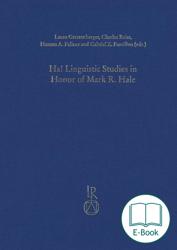This volume celebrates the work of the American linguist Mark R. Hale with contributions from general and historical linguistics, especially comparative Indo-European linguistics, phonological and syntactic theory, and language change.
This volume is dedicated to Mark R. Hale, Professor of Linguistics at Concordia University, Montreal, in celebration of his achievements and his impact on the field of linguistics. Mark Hale’s scholarship is among the most original, thought-provoking and provocative in the field—or fields, rather, since his interests range from comparative Indo-European linguistics and reconstruction to phonological theory, syntactic change, Polynesian comparative reconstruction, Middle Iranian philology, and subgrouping methodology all the way to sociolinguistics. The contributions collected in this volume pay homage to Mark’s work as a scholar and a teacher and represent a considerable subset of his research interests, including comparative reconstruction, phonological and syntactic theory, theoretical approaches to sound change, historical morphology and morphosyntax, the syntax and semantics of clitics across different languages families, and the study of the synchronic grammar of ancient languages.
Laura Grestenberger studied Indo-European Linguistics and General Linguistics at the University of Vienna and at Harvard University, where she received her PhD in 2014. She was Assistant Professor at Concordia University in Montreal (2014-2017) and at the University of Vienna (2017-2021). She is currently Elise-Richter-Fellow at the Institute of Iranian Studies at the Austrian Academy of Sciences and PI of the project “Verbal categories and categorizers in diachrony” funded by the Austrian Science Fund (FWF). Her research focuses on historical and comparative Indo-European linguistics, language change, and morphological and syntactic theory. She has published widely on the nominal and verbal morphosyntax of the older Indo-European languages, with a focus on Greek and Indo-Iranian.
Charles Reiss is Professor of Linguistics in the Department of Classics, Modern Languages and Linguistics at Concordia University, Montreal and cofounder and director of the Concordia Centre for Cognitive Science and Linguistics. He is interested in phonological theory, general linguistics, and the place of linguistics in cognitive science. He is the coauthor of “I-Language: An Introduction to Linguistics as Cognitive Science” (Oxford University Press, 2008), “The Phonological Enterprise” (Oxford University Press, 2008), and “Phonology” (MIT Press, 2018), and the co-editor of “The Oxford Handbook of Linguistic Interfaces” (Oxford University Press, 2007).
Hannes A. Fellner studied historical and theoretical linguistics at the University of Vienna and received his PhD from Harvard University in 2013. He was a postdoctoral researcher at the University of Vienna from 2013-2017 and Assistant Professor at Leiden University from 2017-2018. Since 2018 he is the principal investigator of a START-project funded by Austrian Science Fund dedicated to the research of the Central Asian variants of the Indian Brahmi script. Since 2021 he is Associate Professor for historical linguistics and digital philology at the Department of Linguistics and the Department of European and Comparative Literature and Language Studies at the University of Vienna. He is co-editor of the journals "Die Sprache" (Harrassowitz) and "Tocharian and Indo-European Studies" (Museum Tusculanum). He is a member of the Young Academy of the Austrian Academy of Sciences. His research interests include Indo-European nominal morphology, historical and comparative linguistics and philology of the Indo-European languages of the ancient Silk Road, and theoretical approaches to language change.
Gabriel Z. Pantillon is a research assistant at the Department of Linguistics at the University of Vienna where he studies General Linguistics and Indo-European Linguistics. His research interests include morphology and phonology from a synchronic and diachronic perspective and the theory of language change.


 Sample
Sample